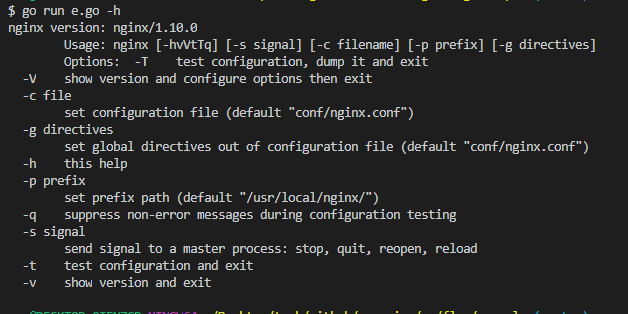1 package main
2
3 import (
4 "flag"
5 "fmt"
6 "os"
7 )
8
9 var (
10 h bool
11 v, V bool
12 t, T bool
13 q *bool
14 s string
15 p string
16 c string
17 g string
18 )
19
20 func init() {
21 flag.BoolVar(&h, "h", false, "this help")
22 flag.BoolVar(&v, "v", false, "show version and exit")
23 flag.BoolVar(&V, "V", false, "show version and configure options then exit")
24
25 flag.BoolVar(&t, "t", false, "test configuration and exit")
26 flag.BoolVar(&T, "T", false, "test configuration, dump it and exit")
27
28 q = flag.Bool("q", false, "suppress non-error messages during configuration testing")
29
30 flag.StringVar(&s, "s", "", "send `signal` to a master process: stop, quit, reopen, reload")
31 flag.StringVar(&p, "p", "/usr/local/nginx/", "set `prefix` path")
32 flag.StringVar(&c, "c", "conf/nginx.conf", "set configuration `file`")
33 flag.StringVar(&g, "g", "conf/nginx.conf", "set global `directives` out of configuration file")
34
35 flag.Usage = usage
36 }
37
38 func main() {
39 flag.Parse()
40 if h {
41 flag.Usage()
42 }
43 }
44
45 func usage() {
46 fmt.Fprintf(os.Stderr, `nginx version: nginx/1.10.0
47 Usage: nginx [-hvVtTq] [-s signal] [-c filename] [-p prefix] [-g directives]
48 Options:`)
49
50 flag.PrintDefaults()
51 }
![]()



 浙公网安备 33010602011771号
浙公网安备 33010602011771号